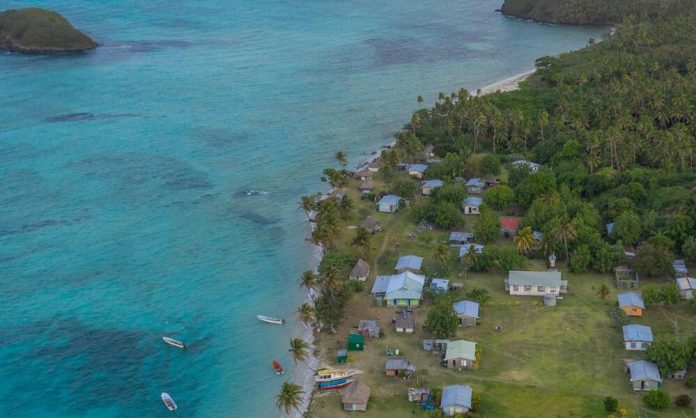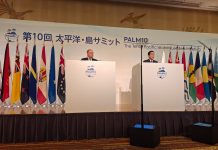
At COP28, Pacific Islands State Leaders launched a bold new Unlocking Blue Pacific Prosperity initiative to safeguard and revitalise the Blue Pacific Continent.
The Bezos Earth Fund applauds and endorses the Pacific Leaders’ bold vision to protect and restore the region’s extraordinary marine ecosystems. Today, the Earth Fund announced plans to provide up to US$100 million in grants to support the design and implementation of the conservation plan.
This groundbreaking initiative will establish sustainable management across 100 percent of the Blue Pacific Continent, nearly 50 percent larger than all of Africa and five times the size of the United States. It will protect 30 percent of the continent, more than 1 billion hectares, to strengthen the ocean’s resilience to climate impacts.
The Pacific Islands leaders’ strategy also aims to establish sustainable coastal food systems and restore and rejuvenate the coral reefs, mangroves, and other coastal ecosystems that are the foundation for food security, livelihoods, and culture in the Pacific Islands. In support of this initiative by the Pacific Heads of State and Ministers, the Earth Fund’s commitment will enable efforts to restore and protect these coastal ecosystems and strengthen community-based fisheries management and conservation.
“Pacific Islands States are custodians of 30 percent of the world’s precious coral systems, provide over 50 percent of the global tuna supply, and care for the largest carbon sink on the planet,” said Dr Andrew Steer, President and CEO of the Bezos Earth Fund. “We are delighted to lend our support for this bold initiative to secure the health, food security, and livelihoods of people across the region. We urge other partners to join us to support this bold vision.”
“There is no greater threat to the people of the Pacific than climate change,” said President Surangel Whipps of Palau. “It threatens our security, our livelihoods, and our wellbeing. We are committed to leading this effort to protect our region and its extraordinary cultures and ecosystems. We’re thrilled to partner with the Bezos Earth Fund on this initiative and call on others to join us.”
“We understand that, because of its vast size, what happens to our Pacific is make or break for the planet. That’s why we have committed to protecting 30 percent of our Blue Continent as we strive to protect and sustainably manage critical ecosystems. We mean to show the world that Pacific people are resilient and determined to hope, despite the dire Global Stocktake report card,” said the Prime Minister of Tonga.
“We celebrate the efforts of Pacific Islanders to protect and restore coastal ecosystems, which are foundational to life — both human and marine — across their islands and territories,” said Dr Cristián Samper, Managing Director and Leader for Nature Solutions at the Bezos Earth Fund. “The Bezos Earth Fund is committed to protecting 30 percent of our land and ocean to safeguard nature and to support food security and development in this decisive decade. Pacific Islands Heads of State are leading the charge, and we urge the international community to follow suit and create and implement similar plans to protect the world’s oceans.”.
Enric Sala, the founder of Pristine Seas and the National Geographic Society’s Explorer in Residence in response to an announcement by Pacific governments and the Bezos Earth Fund said: Pacific Islanders are experiencing the worst impacts of the climate crisis, which they did not cause. Yet their ocean is also poised to offer an effective climate solution unlike any other. I have seen with my own eyes how local and Indigenous communities across the Pacific have protected some of their waters, with incredible results. And science has shown over and over that fully protected areas are key to fostering climate resilience. Protecting marine ecosystems will pay off in dividends now and in the future – for marine life, people and the climate. Now it’s time for the rest of the world to follow the lead of these visionary Pacific leaders so we can collectively achieve 30×30 by 2030.
SOURCE:NATIONAL GEOGRAPHIC SOCIETY PRISTINE SESA/PACNEWS

















